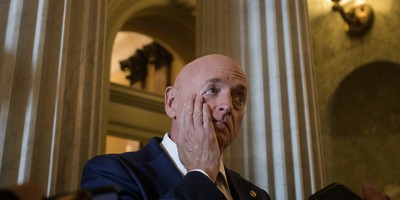Why has Sen. Dick Durbin (D-Ill.) declared war on credit cards?
Americans are in love with paying with plastic.
Perhaps too much so -- given that credit card debt now exceeds $1 trillion.
But paying with plastic has become a sort of American pastime -- so popular and convenient (especially reward programs that offer cash-back payments, frequent flyer miles and other discounts) that there are now an estimated 500 million to 1 billion credit cards in circulation and close to another 1 billion debit cards. This means there are multiple more credit and debit cards than there are adults in the U.S.
That's a big change from 20 to 30 years ago when only upper-income Americans had access to plastic cards for swiping (and now tapping), while middle- and especially lower-income Americans had to carry around wads of cash for transactions or go to a loan shark for emergency money.
But you know another group that loves the convenience of credit cards? Stores, restaurants, merchants, online services. They have vastly expanded retailers' transactions and sales. This year, there will be nearly $5 billion of plastic card (or cellphone) financial transactions, two to three times the amount in 2012.
Some smaller stores don't accept credit cards, but those numbers are dwindling. Even corner shoeshiners are accepting plastic these days. Taking Visa, Mastercard, American Express or any of the dozens of other credit cards also reduces the burden of handling cash, reduces theft at the cash register, and in most cases, the credit card companies assume the risk of nonpayment. They do all this for an "interchange fee" charged to merchants that averages around 2%.
Recommended
What retailers don't like is paying that fee.
They've run to Congress for help, and Durbin has obliged with his so-called Credit Card Competition Act. Given that there are dozens of cards to choose from, and that retailers are free to create their own credit cards for customers (as used to be the case with Sears and J.C. Penney cards), the argument that Visa and Mastercard lack competition is a bit far-fetched.
Durbin's bill would impose implicit price controls on credit cards by mandating that every Visa and Mastercard card also carry the logo of a cut-rate competitor's network. This is like requiring McDonald's to show its customers the Burger King and Wendy's menu and prices. What's demoralizing is that many Senate Republicans have signed on to this bill to regulate an industry that works for everyone.
Last week, the senators released a "study" claiming that this bill would save the average consumer $1,000 a year. But this was the very same claim Durbin made about his debit card price controls. The consumers didn't save money; the merchants pocketed nearly all the money and it nearly ended "free checking" services by banks. To the extent that there are cash savings passed on to consumers, The Wall Street Journal has noted that this would likely come at the expense of fewer reward points for credit card holders.
And if swiping fees are such a financial burden on small and large retailers, let's see them go for a few weeks without them.
The credit card market isn't broken; it's flourishing as America moves rapidly to becoming a nation where nearly everyone has access to the convenience of cheap credit at their fingertips. The last thing consumers and sellers need is for Congress to "fix it."

























Join the conversation as a VIP Member